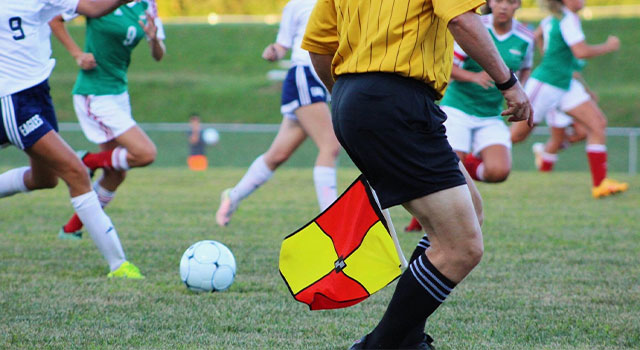 Injuries take the fun out of sports activities, especially if they affect your vision. Bumps to the head, impact from fast-moving objects, and prolonged sun exposure can all damage your eyes.
Injuries take the fun out of sports activities, especially if they affect your vision. Bumps to the head, impact from fast-moving objects, and prolonged sun exposure can all damage your eyes.
The good news is that most sports-related eye injuries or bruises can be prevented by wearing protective eyewear and by undergoing sports vision training.
Sports Vision Training & Injuries
When your visual abilities aren't up to par, you may underestimate the distance between yourself and the ball or between yourself and other players. Due to limited peripheral vision, miscalculating the velocity of a ball or the location of competing players may result in significant head or other injuries.
This is why, like exercising your muscles, it's important to train your eyes to communicate more efficiently with your brain and body. Sports vision training can help you perform better and protect your head and brain from injury.
At Sports Vision Centre at Ancaster Family Eyecare in Ancaster, we provide a customized regiment of exercises to strengthen your visual skills and help prevent eye injuries.
How Sports Injuries Affect the Eyes
Sports injuries can affect your eyes directly, such as when a moving object hits your eye, or indirectly via a blow to the head that disrupts normal vision.
The following are common injuries that can harm your eyes or affect your vision:
1. Blunt Trauma
Getting hit in the eye or face with a speeding ball or being slammed by a running opponent can affect your eyes in a number of ways.
The area around your eye can appear purple or black if there’s bleeding around the outside of the eyes or behind the eyelids. Blunt impact to the eye itself can cause internal eye damage and dislodge the retina, the thin, light-sensitive layer in the back of the eye. If not treated quickly, a detached retina can result in sudden vision loss. A major blow requires immediate medical attention if the globe of the eye ruptures, resulting in structural damage to the eye.
2. Concussion
Concussions are among the most prevalent injuries sustained in sports.
After receiving a blow to the head, you may experience blurry or double vision, difficulty reading or poor eye-hand coordination. These are signs of post-trauma vision syndrome: a disruption in the communication between the eyes and the brain. Fortunately, neuro-optometric rehabilitation can be an effective treatment for post-traumatic vision syndrome.
3. Object Penetrating the Eye
Even a small object that penetrates your eye – such as a stick that’s airborne while mowing the lawn – can cause significant eye damage and even vision loss. The severity and type of damage will depend on the size of the object and how deeply it penetrates the eye.
4. Corneal Abrasion
Flying debris and moving objects – such as a road pebble hitting the eye while cycling – that don’t penetrate your eye can still scratch the cornea, the front of your eye. Corneal abrasions can cause pain, blurry vision and make your eye sensitive to light or result in excessive tearing. Contact your eye doctor, who will examine your scratched cornea and provide treatment to preserve your vision.
5. Eye Damage from UV Rays
Baseball, tennis, golf and skiing are just a few of the popular outdoor sports that often require spending hours in the sun. Excessive exposure to the sun’s UV rays has been linked to an increased risk of damage to the cornea, and eye conditions such as cataracts and macular degeneration. If you love outdoor sports, get a pair of sports sunglasses that screen out 100% of UVA and UVB rays.
How to Avoid Concussion or Eye Injury
Consider sports vision training. Sports Vision Centre at Ancaster Family Eyecare in Ancaster can help you perform better and protect your head and brain from injury. We can also advise you on protective eyewear to shield your eyes during sports activities.
Frequently Asked Questions with Dr. Priya Maharaj
Q: Why do I have blurry vision after playing football?
A: The most common cause of blurry vision after playing football is a concussion, a type of traumatic brain injury. In addition to blurry vision, a TBI can cause double vision, headaches, dizziness and nausea. If you experience vision problems even weeks after a head injury, be sure to schedule a comprehensive [eye exam].
Q: Which sport causes the most eye injuries?
A: While all sports carry some risk of injury, baseball and basketball cause the most eye injuries, followed by water sports and racket sports. Fortunately, most of these injuries are preventable if you wear the right sports eyewear. Visit us at Sports Vision Centre at Ancaster Family Eyecare and find the sports glasses and goggles to protect your eyes.
